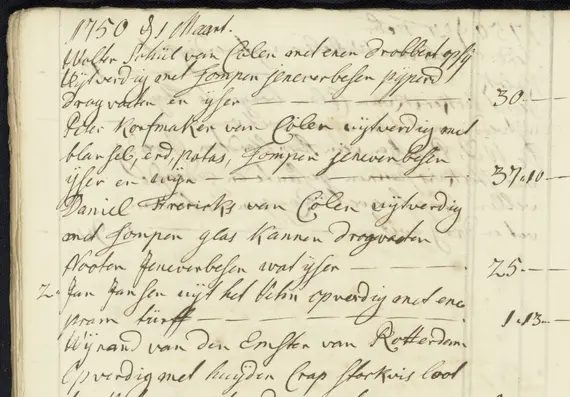Update
This seed funded project was finished on September 30, 2022.
For recent information, see "The Rhine's Invisible Carriers".
Digitale Erschließung einer seriellen Quelle für die niederländisch-deutsche Rheinschifffahrt in der Frühen Neuzeit: Pilotstudie über die Zollregister von der Schenkenschanz (1630-1810), von der automatischen Handschrifterkennung bis zur Online Datenbank.

A preparatory project of Prof. Dr. Werner Scheltjens (Digital History) and Prof. Dr. Christof Rolker (Auxiliary Sciences of History), financed by funds from internal project funding (FNK).
The seed-funded project „Digital Exploration of a Serial Source for Dutch-German Rhine Shipping in the Early Modern Period: Pilot Study on the Customs Registers of the Schenkenschanz (1630–1810), from Automated Handwritten Text Recognition to an Online Database” plans to conduct a pilot study on the digital exploration of the customs registers of the Schenkenschanz, a customs post on the Rhine river not far from the Dutch-German border. The preserved registries consist of around 9,000 pages for a period of about 180 years and today are kept in Utrecht.
In order to elaborate a third-party funding proposal for a larger Digital Humanities project, a pilot study is carried out in which central methodological aspects of an efficient workflow for the planned project will be addressed, individual components of the projects will be tested, and preliminary results will be valued and, if possible, presented to experts on the field for discussion. In doing so, the central methodological aspects are:
- The generating of data using automated handwritten text recognition technologies for pre-modern handwritten sources.
- The selection of a database structure suitable for the planned digital exploration and online publishing.
- The preparation and, if possible, preliminary development of a suitable online access for the processed data.
In parallel to the methodological aspects the preparatory project aims to clearly identify the possibilities of the digitally explored customs registers from the Schenkenschanz for innovative historical research and to illustrate the relevance of the digitisation project for different sub-disciplines of the historical sciences. The pilot study is central to the preparatory project, where various tools and methods in the fields of automated layout analysis, automated handwritten text recognition, database development and online publishing of historical databases will be compared. In regards of exploring the corpus of names it is to be tested which methods are best suited to automate the recognition of persons names to a greater extent.
In addition, the pilot study also aims to provide an insight into the evaluation possibilities of the digitally collected data. For this purpose, two small case studies in the field of trade and transport history in the pre-industrial period and in the field of historical onomastics will be conducted on the basis of the data collected in the pilot study. Furthermore, the name corpus obtained in this way will be used to examine whether the names of the Rhine boatmen recorded in the register indicate specific naming practices in this milieu, respectively profession, and, if so, when within the rather long examined period this is the case. Finally, quantitative data for the tools tested in the pilot study will be collected and assessed in regards of reliability, performance and applicability in the context of the planned project.
[Translation: Franziska Decker]